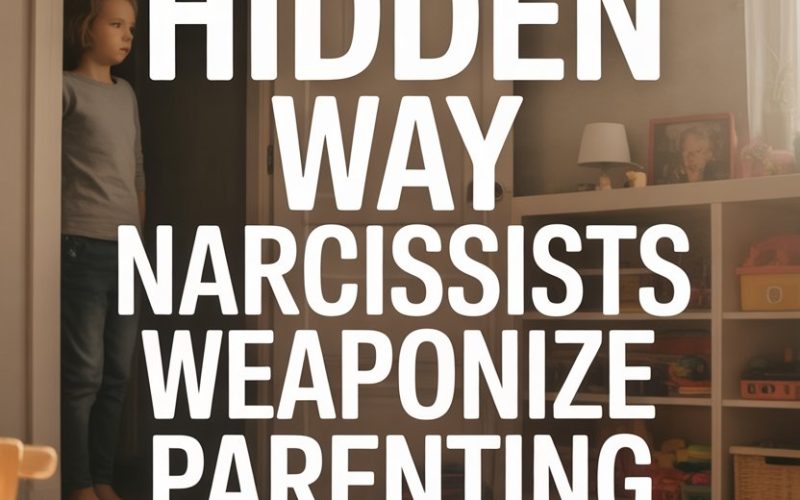Some people collect stamps, others collect houseplants. Narcissists? They collect parenting time like rare baseball cards—then use it as ammunition.
If you’ve ever watched your ex transform a pickup schedule into a Machiavellian power play, you’re not alone.
Parenting after separation can feel a bit like juggling flaming knives; add a narcissist to the mix and you might wish for a good old-fashioned pie fight instead.
It’s not just about missing a Saturday soccer match or forgetting the school bake sale (again). Narcissists use parenting time for something far stickier: control.
And the children? They’re often caught in the crossfire.
The Calendar as a Battlefield
To many, a custody agreement is a guideline—a roadmap for who gets the kids and when. For narcissists, it’s more like Monopoly: rules are bendable, and every move is a strategy.
You might notice the constant “misunderstandings” about drop-off times, or the sudden emergencies that just happen to coincide with your scheduled weekend.
A narcissistic parent thrives on unpredictability, using the calendar to disrupt routines and keep everyone off balance.
Kids crave structure. When it’s intentionally withheld or constantly jumbled, it leaves children anxious, never quite sure where they’ll lay their head that night.
This isn’t just poor time management; this is a tactic as old as the hills and twice as infuriating.
Manipulating the Narrative
Ever been painted as the unreliable parent? Welcome to the narcissist’s favourite pastime.
They’ll twist every scheduling hiccup into evidence that you’re disinterested or disorganized, while they swoop in as the ever-present hero.
This storytelling isn’t limited to adults. Children may hear, “Mum can’t be bothered to pick you up,” or, “Dad always cancels because he’s got better things to do.”
The goal? Isolating the child’s affections and planting seeds of doubt—about your love, your reliability, even your integrity.
Experts, including Dr. Karyl McBride, author of “Will I Ever Be Free of You?”, note that narcissists’ need to win at all costs often means rewriting history, one custody exchange at a time.
Alienation—With a Smile
The narcissist’s brand of alienation isn’t always brash. Frequently, it shows up in whispers, sighs, or “accidental” slip-ups (“Oh, I forgot to tell you Mum was supposed to come today”).
They might sabotage communication, lose messages, or “forget” to inform you about school events.
This subtle, relentless undermining can leave you feeling like you’re playing whack-a-mole with your own reputation.
Meanwhile, the child is left in the confusing position of juggling two conflicting realities—one where you’re the absentee parent, and one where you’re just trying to make the best of a tricky hand.
Guilt Trips Galore
Narcissists are Olympic-level guilt trippers. They’ll make the child feel responsible for the chaos (“If you didn’t want to see Mum, we wouldn’t have to do this every week”)—or blame you for “upsetting” routines.
If you try to enforce boundaries or stick to the schedule, you might be accused of being rigid or uncaring. Try to be flexible? Suddenly, you’re the pushover who doesn’t care enough to fight for more time.
It’s a win-win—for them. For you, it’s like running on a treadmill that never stops (and not the kind that trims your waistline).
Using Parenting Time as a Bargaining Chip
Ever had parenting time dangled in front of you like the last slice of cake? Narcissists treat access to the children as a commodity, traded for favours, money, or just the satisfaction of making you grovel.
You might hear, “If you want to see the kids next weekend, you’ll need to switch this week,” or “I’ll consider letting them stay an extra day if you do X for me.”
Courts frown on this behaviour, but it still happens behind closed doors, often too subtle (or slippery) to pin down.
Public Performances and Private Games
Publicly, the narcissistic parent may shine as the doting carer—the one who never misses a school play or posts endless snaps to Facebook, all #blessed and #singleparentlife.
Privately, they might refuse to communicate, ignore your messages, or undermine your parenting at every turn.
This two-faced approach leaves you looking like the grumpy killjoy when you object (“Don’t you want your child to have a relationship with both parents?”).
Meanwhile, the narcissist is collecting sympathy and likes from friends, teachers, and even judges, all the while sowing discord in the background.
Legal Loopholes and Loophole-Hopping
Nothing delights a narcissist more than finding a loophole. Vague language in custody agreements? That’s their playground. They might exploit wording to stretch holidays, skip visits, or “interpret” the agreement in their favour.
Family law professionals, such as Bill Eddy from the High Conflict Institute, say that narcissists thrive in conflict-ridden situations, using ambiguity to their advantage.
If a clause can be twisted, you can bet they’ll give it a good go.
Detailed, clear agreements—think “Return child to Mum at 5:00pm at the blue slide in Tiddlywinks Park”—don’t just make life easier for judges. They make it much harder for a narcissist to wriggle out of their commitments.
The Emotional Toll on Kids
Children are not oblivious, even if they won’t say so over their cornflakes. Living in a tug-of-war between battling parents, especially when one parent is using time as a weapon, is emotionally exhausting.
Kids might act out, withdraw, struggle at school, or develop physical symptoms like headaches or stomach aches.
Dr. Craig Malkin, author of “Rethinking Narcissism”, notes that children exposed to chronic parental manipulation can struggle with trust and self-esteem well into adulthood.
Your child may not be able to articulate what’s wrong. You might just notice a change in their mood, reluctance to transition between homes, or a newfound resistance to talking about their time with the other parent.
Practical Sanity-Saving Moves
Wish you could magic away the narcissist’s antics? Until someone invents that app, you’re not powerless. Here are some battle-tested strategies:
- Get It In Writing: Keep records of every communication. Email or a parenting communication app (like OurFamilyWizard) is your friend—far more reliable than the “he said, she said” game.
- Stick to the Schedule: Flexibility is great in yoga, less so with a narcissist. Treat the custody agreement like a sacred text and gently remind the other parent (and your kids) of what’s expected.
- Limit Emotional Engagement: Debating with a narcissist is like wrestling a pig—you both get dirty, but the pig enjoys it. Keep communication brief, factual, and business-like.
- Focus on the Kids: Routines, rituals, and open lines of communication help anchor children, even if chaos swirls around them. Carve out special time, listen (really listen), and remind them that both parents love them, even when one is acting more like a Bond villain than a co-parent.
- Lean on Your Support Team: Therapists, support groups, trusted friends—they’re not just for venting. They can help you spot patterns, regain perspective, and remind you that you are, in fact, a good parent.
When the System Fails
Sometimes, even the best strategies don’t stop the madness. Courts are getting wiser to these tactics, but the gears of justice grind slowly (and sometimes, only on alternate Tuesdays).
If your ex’s behaviour crosses from irritating to harmful—if children are being emotionally abused or routinely denied contact—consider reaching out to a child psychologist, family therapist, or solicitor who specialises in high-conflict cases.
Resources like the National Association of Family Court Judges offer guidance and referrals for parents caught in these battles.
Why It Feels Personal—And Why It Isn’t
It’s tempting to take the narcissist’s behaviour personally, especially when every missed visit or twisted story seems aimed straight at your heart. But here’s the sticky truth: it isn’t about you.
Narcissists weaponize parenting time because it’s an easy way to maintain power, not because you’re failing as a parent.
That said, it’s not your job to fix, cure, or convert a narcissist. Your responsibility? Protecting your child’s right to love—and be loved by—both parents, wherever possible.
And when that’s not possible, keeping their world steady, loving, and (mostly) predictable.
A Little Hope for the Road
No one writes parenting plans with “duel at high noon” in mind. Yet, with a narcissistic co-parent, that’s often what it feels like.
You’re not alone, and you’re not powerless. Every boundary you hold, every routine you protect, and every moment of unconditional love you show your child chips away at the narcissist’s hold.
Sure, there will be days when you wish you could swap places with the postman or buy a one-way ticket to New Zealand.
But your child’s resilience—and your own—grow every time you meet this challenge with grace, humour, and a steadfast refusal to play the narcissist’s game.
Tea’s gone cold, but your resolve is just warming up. Keep going. Your child’s safe harbour is never wasted effort.





